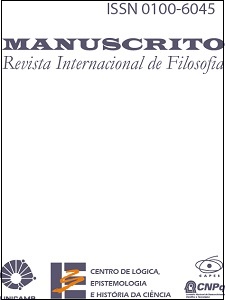Resumo
What are we, most fundamentally? Two topical answers to this question are discussed and rejected and a more evolutionary account is offered. Lynne Baker argues that we are persons: beings with a firstperson perspective. Persons form a separate ontological category, with persistence conditions that are different from those of the body. Eric Olson, by contrast, claims that we are human organisms. No psychological property is definitive of what we are. Our persistence conditions are those of the human organism. In a more evolutionary approach to the notion of personhood, it is argued that we are indeed, most fundamentally, beings with a first-person perspective. But such a perspective is not definitive of personhood. It is precisely living organisms that have it, and cannot fail to have it. There is no separate ontological category of persons.
Referências
BAKER, L.R. Persons and Bodies. A Constitution View. Cambridge: Cambridge University Press, 2000.
BAKER, L.R.. “Reply to Olson”. Symposium on Persons and Bodies. In: A Field Guide to Philosophy of Mind, 2001a.(http://host.uniroma3.it/progetti/kant/field/bakersymp_replytoolson.htm).
BAKER, L.R. “Reply to Garrett”. Symposium on Persons and Bodies. In: A Field Guide to Philosophy of Mind, 2001b. (http://host.uniroma3.it/progetti/kant/field/bakersymp_replytogarrett.htm).
BERMÚDEZ, J.L. The Paradox of Self-Consciousness. Cambridge, Mass./London: The MIT Press, 1998.
BETTELHEIM, B. The Informed Heart: Autonomy in a Mass Age. Glencoe, Ill: Free Press, 1960.
BREWER, B. “Bodily awareness and the self” In: J.L. Bermúdez, A. Marcel and N. Eilan (eds.). The Body and the Self. Cambridge, Mass./London: The MIT Press, pp. 291-310, 1995.
CAMPBELL, D.T. “Evolutionary epistemology”. In: P.A. Schilpp (ed). The Philosophy of Karl Popper. La Salle, Ill.: Open Court, pp. 413-463, 1974.
CUYPERS, S.E. Self-Identity and Personal Autonomy. An Analytical Anthropology. Aldershot: Ashgate, 2001.
DENNETT, D.C. “Conditions of personhood”. In: D.C. Dennett Brainstorms. Philosophical Essays on Mind and Psychology. Hassocks, Sussex: Harvester Press, pp. 267-285, 1978.
DENNETT, D.C. The Intentional Stance. Cambridge, Mass./London: The MIT Press, 1987.
DENNETT, D.C. Consciousness Explained. Boston/Toronto/London: Little, Brown and Company, 1991.
EDELMAN, G. The Remembered Present: A Biological Theory of Consciousness. New York: Basic Books, 1989.
EVANS, G. The Varieties of Reference. Edited by J. McDowell. Oxford: Clarendon Press/New York: Oxford University Press, 1982.
FORD, N. When Did I Begin? Cambridge: Cambridge University Press, 1988.
FRANKFURT, H.G. “Freedom of the will and the concept of a person”. Journal of Philosophy, 68, pp. 5-20, 1971.
GALLISTEL, C.R. The Organization of Learning. Cambridge, Mass./London: The MIT Press, 1990.
GARRETT, B. “The story of I: some comments on L.R. Baker Persons & Bodies”. Symposium on Persons and Bodies. In: A Field Guide to Philosophy of Mind, 2001 (http://host.uniroma3.it/progetti/kant/field/bakersymp_garrett.htm).
GIBSON, J.J. The Ecological Approach to Visual Perception. Boston: Houghton Mifflin Company, 1979.
HELD, R. and HEIN, A. “Movement produced stimulation in the development of visually guided behaviour”. Journal of Comparative andPhysiological Psychology, 56, pp. 872-876, 1963.
LOCKE, J. [1690]. An Essay Concerning Human Understanding. Collated and annotated by A. Campbell Fraser. New York: Dover Publications, 1959.
MATURANA, H.R., VARELA, F.J. “Autopoiesis: the organization of the living”. In: H.R. Maturana, F.J. Varela (eds.). Autopoiesis and Cognition: The Realization of the Living. Boston Studies in the Philosophy of Science, vol. 42. Boston: D. Reidel, 1980.
MEIJSING, M. 1997. “Awareness, self-awareness and perception. An essay on animal consciousness”. In: M. Dol, S. Kasanmoentalib, S. Lijmbach, E. Rivas, R. v.d. Bos (eds). Animal Consciousness and Animal Ethics. Perspectives from the Netherlands. Assen: Van Gorcum, pp. 48-61, 1997.
MEIJSING, M. “Person and perspective. On the role of first and third person perspective in personhood and personal identity”. In: T. Derksen (ed). The Promise of Evolutionary Epistemology. Studies in General Philosophy of Science, vol. 5. Tilburg: Tilburg University Press, pp. 131-156, 1998.
NAGEL, T. “What is it like to be a bat?”. Philosophical Review, 83, pp. 435-451, 1974.
NAGEL, T. The View From Nowhere. Oxford: Oxford University Press, 1986.
OLSON, E.T. The Human Animal. Personal Identity Without Psychology. New York/Oxford: Oxford University Press, 1997.
RORTY, A.O. “Persons and personae”. In: C. Gill (ed). The Person and the Human Mind. Issues in Ancient and Modern Philosophy. Oxford: Clarendon Press, 1990.
SHOEMAKER, S. “Self-reference and self-awareness”. Journal of Philosophy, 65, pp. 555-567, 1968.

